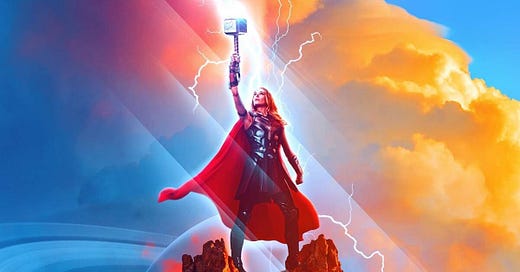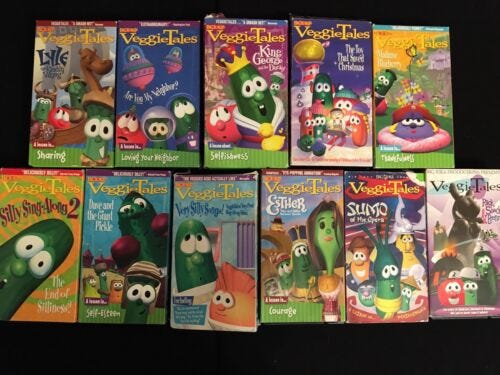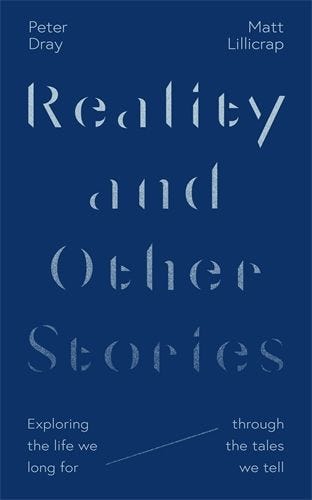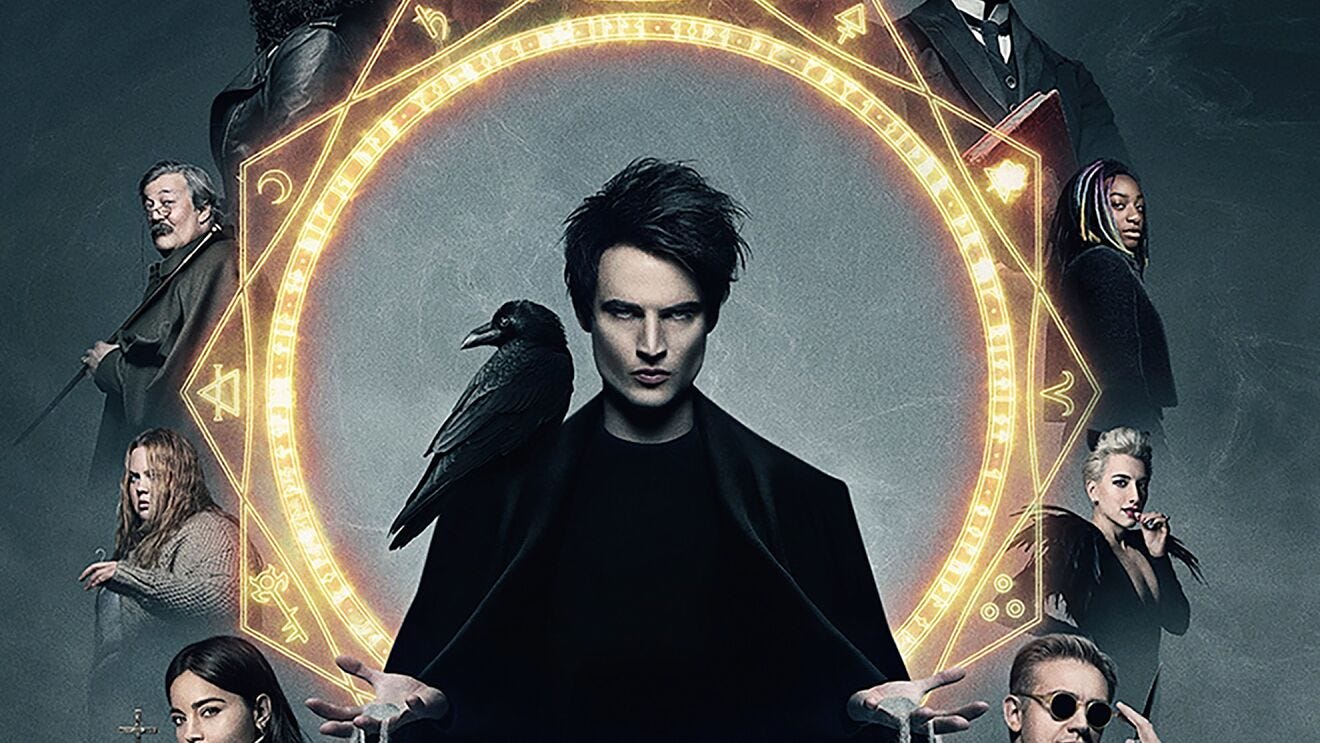Thor, VeggieTales, and the missing awe in Christian storytelling
What Taika Waititi's Thor movies and Christian wacky Bible retellings get wrong with misplaced humour
Back in Viking times, Christians apparently invented stories about how Christ was able to beat up Thor, as part of their evangelism to pagan warriors. It’s been about a thousand years since Christ and Thor were in genuine religious competition. But with Thor as part of the current MCU pantheon of superheroes, I guess what goes around, comes around eventually!
It’s intriguing that Marvel has perhaps struggled to make the Thor movie series connect with viewers, similar to Christians trying to make Jesus ‘relevant’ to people today. I recently watched Thor: Love and Thunder, and was struck by the parallel between its over-reliance on humour, and on the often cringey pantomime humour of Christians trying to make the faith ‘relevant’, especially for kids.
There’s a lesson for all storytellers here: humour needs to support the story you are telling, rather that undercut it. But especially for Christians, if we believe the Bible to be a sacred story, how do we make it engaging while also doing the story justice and reverence on its own terms?
No Thor feelings?
(No sore feelings/Thor feelings, geddit? Never mind!) To be fair, there was lots that was good and interesting in Thor: Love and Thunder – Natalie Portman as the Mighty Thor, Christian Bale’s Gorr the Godbutcher vowing ‘all gods must die’, the whole question of what makes a god worthy?
But like Thor: Ragnarok before it, it suffered from Taika Waititi’s lack of restraint when it comes to humour. It leans in heavily to the flanderization of Thor’s character, making him into even more of a clueless ‘limbo’ (it brings a whole new meaning to the label ‘theobro’). While I enjoy a good joke as much as anyone, I also like to be able to believe in and care about the characters in the stories I watch. Being asked to care about Thor’s relationship with Jane was like being asked to root for Scrappy Doo’s love life – there’s no longer any realistic interior life to the character.
There were also some odd omissions – for example, we didn’t see Jane Foster’s transformation into the mighty Thor, which could have been an awe-inspiring moment, and a key emotional beat for Jane’s journey. The story was framed instead from Thor Odinson’s perspective, to its detriment.
Waititi might have been skilful in making the Thor movies more fun but I think it’s hard to defend that they are better as stories than the first two movies (well, maybe The Dark World – that was both a badly told story and dull, apart from some occasionally fun Thor/Loki bickering). Thor: Ragnarok actually has some pretty weighty things happen to Thor – losing his father, becoming king, seeing his homeworld of Asgard destroyed – yet these are undermined by quips, humour that punctures the story rather than enhancing it.
Beyond VeggieTales
Which brings me to Christian attempts to make the Bible ‘fun’. Often this involves putting on silly voices and making lots of jokes and going a bit pantomime with it all, especially if it’s a ‘family service’ or ‘all-age service’, designed to be accessible to the kids.
One of the pinnacles of this approach is VeggieTales, a computer-animated Christian kids show that started in the 1990s, and retold Bible stories with talking vegetables – David and Goliath becomes Little Dave (an asparagus) facing off against a Giant Pickle, and so on.
Lots of Christians love VeggieTales and hold it up as a positive example of Christian creativity. It kind of passed me by growing up as a kid - my church context in North Wales was a long way removed from what was trendy in church youth circles. By the time I first encountered it, I was too grown up to really appreciate it. But personal biases aside, I think it has major limitations in terms of creative approach.
Before I get mobbed by VeggieTales fans, let me give some caveats. There is lots of healthy creativity in VeggieTales. I love a good sketch and I’ve done my fair share of dressing up and putting on a silly voice to retell Bible stories or act out some illustration, especially on camps and beach missions! There’s certainly a place for fun and humour, and for the humorous sermon illustration that helps engage people with the truths the preacher is communicating.
But I worry that as Christians, we often don’t have a big enough vision for creativity beyond wackiness. Stuff like VeggieTales has its place, but if it’s one of the high watermarks of your Christian subculture, something is badly broken and missing.
We settle for zany, when we should be aiming for beauty and wonder.
It’s like early 2000s Dreamworks, where they would throw together a bunch of jokes and pop culture references and forget to tell a meaningful story – the only Shrek movie I really enjoy is the first one, since that’s the only one that also functions as a successful fairy-story.
Pixar’s films of the time – the Toy Story movies (late 90s), Finding Nemo (2001), Monsters Inc (2003), The Incredibles (2004) and so on – are all both fun and deeply committed to the emotional truth of the story they are telling.
To be fair, Dreamworks did start taking storytelling more seriously, catching up with films such as Kung-Fu Panda (2008), which is driven by well-constructed storytelling arising out of well defined characters and motivations, as well the How to Train Your Dragon trilogy, from 2010 onwards).
But the best of both studios’ films show us this: You can be fun and reverent, engaging and sincere.
Aim for Awe
We need to have a greater creativity and confidence as Christian storytellers. We need to have confidence in the power of story. In particular, Christians need to have confidence in the power of the Christian story.
The Bible isn’t something boring we need to zhuzh up with wackiness, but God’s powerful Word and compelling story that creativity can help unlock and unleash.
In spring, I saw a script being shared online for a pantomime-style retelling of the Easter story – the death and resurrection of Jesus Christ, through the eyes of the Easter Bunny as he discovers the true meaning of Easter. While well-intentioned, it made my heart heavy – do we really think inserting a cartoon character into this most ancient and powerful of stories of death, redemption and resurrection is really necessary?
The Bible has been speaking to the deepest questions and longings of human existence for thousands of years, so be faithful to that, resonate with that. And perhaps by God’s grace we will capture some echo of the eternal beauty, goodness and truth that points us to his ultimate reality and beauty.
If we want to engage people’s hearts, go beyond just humour, wackiness and pop culture references. Embrace wonder, seek emotional truth. Point people to God’s glory, and aim for awe!
Miscellanea
Reality and Other Stories - out now
Pete Dray and Matt Lillicrap have written a wonderful and fascinating exploration of how the seven basic plots reveal humanity’s deepest longings, and how the longings are fulfilled in Jesus. I was involved with the commissioning of this book for IVP and I’m delighted that it’s out now!
Buy now: IVP - Amazon.co.uk - Eden.co.uk
Also check out this fun interview between the authors and Nate Morgan Locke from Speak Life:
Neil Gaiman’s The Sandman - first thoughts
As a fan of the original comics, I’ve watched this on Netflix and it’s really rather good! Both the comics and TV series are quite dark and graphic, so be aware of the 18 rating if that’s not going to be your cup of tea. Interestingly, The Sandman contains all of the seven basic plots but one… and that absence is rather telling.
Stay tuned for an upcoming article exploring this in more depth!
The Imaginative Discipleship podcast - coming soon
The next phase of the Bigger on the Inside project is launching in late Sept/early Oct… watch this space, or drop me a line on caleb@biggerinside.co.uk if you want to suggest a topic or would like to be a guest!








